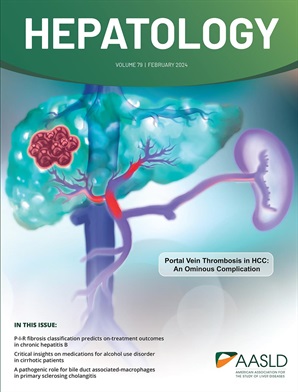MSR1+ macrophages passivate antitumor immunity by inducing ITM2A+ CD4T exhaustion differentiation.
IF 15.8
1区 医学
Q1 GASTROENTEROLOGY & HEPATOLOGY
引用次数: 0
Abstract
BACKGROUND AIMS Immune-checkpoint inhibitors target the membrane protein; however, the role of membrane proteins in antitumor immunity remains poorly elucidated. In this study, we aimed to explore the role of membrane proteins and unearth potential membrane proteins that can be targeted. METHODS We initially screened prognosis-related membrane proteins based on The Cancer Genome Atlas Program and International Cancer Genome Consortium databases. Whole-gene, T-cell-specific or CD8T-cell-specific integral membrane protein 2A (ITM2A) knockout mice were constructed and used for orthotopic transplantation or as plasmid-derived spontaneous hepatocellular carcinoma (HCC) models to explore the role of ITM2A in the TME. Through scRNA sequencing, TimiGP analysis, molecular dynamics simulations, and biochemical experiments, the molecular mechanisms underlying the MSR1-ITM2A-TCR signaling regulatory axis were explored. Finally, bioengineering technologies were used to design and construct a new CD4T-targeted antibody-drug conjugate (ADC). RESULTS High ITM2A expression in HCC indicated a superior prognosis, which was associated with richer immune cell infiltration in the TME. The results of the single-cell RNA-sequencing of the HCC model in genetically knocked-out mice suggest that ITM2A influences the TCR signaling of TILs in the TME. This inference was confirmed in conditional ITM2A knockout mice. MSR1+macrophages induced CD4T exhaustion by disrupting the ITM2A-ZAP70 axis during TCR activation. ADC (ZEA-αCD4) treatment effectively inhibited tumor growth, independent of the classical αPDL1 immunotherapy. CONCLUSIONS MSR1+macrophages promote tumor-infiltrating ITM2A+CD4T exhaustion differentiation by regulating the ITM2A-ZAP70 axis. ZEA-αCD4 specifically targeted MSR1-ITM2A interaction to activate antitumor immunity and improve the efficacy of αPDL1 immunotherapy.MSR1+巨噬细胞通过诱导ITM2A+ CD4T衰竭分化钝化抗肿瘤免疫。
aimimmune -checkpoint抑制剂靶向膜蛋白;然而,膜蛋白在抗肿瘤免疫中的作用尚不清楚。在这项研究中,我们旨在探讨膜蛋白的作用,并发现潜在的可靶向的膜蛋白。方法我们首先基于癌症基因组图谱计划和国际癌症基因组联盟数据库筛选与预后相关的膜蛋白。构建全基因、t细胞特异性或cd8t细胞特异性整体膜蛋白2A (ITM2A)敲除小鼠,用于原位移植或质粒来源的自发性肝细胞癌(HCC)模型,以探索ITM2A在TME中的作用。通过scRNA测序、TimiGP分析、分子动力学模拟和生化实验,探索MSR1-ITM2A-TCR信号调控轴的分子机制。最后,利用生物工程技术设计并构建了一种新的cd4t靶向抗体-药物偶联物(ADC)。结果ITM2A在HCC中的高表达预示着较好的预后,这与TME中较丰富的免疫细胞浸润有关。基因敲除小鼠肝癌模型的单细胞rna测序结果表明,ITM2A影响TME中TILs的TCR信号传导。这一推断在条件ITM2A敲除小鼠中得到了证实。在TCR激活过程中,MSR1+巨噬细胞通过破坏ITM2A-ZAP70轴诱导CD4T衰竭。ADC (ZEA-αCD4)治疗有效抑制肿瘤生长,不依赖于经典的αPDL1免疫治疗。结论smsr1 +巨噬细胞通过调控ITM2A- zap70轴促进肿瘤浸润性ITM2A+CD4T衰竭分化。ZEA-αCD4特异性靶向MSR1-ITM2A相互作用,激活抗肿瘤免疫,提高αPDL1免疫治疗效果。
本文章由计算机程序翻译,如有差异,请以英文原文为准。
求助全文
约1分钟内获得全文
求助全文
来源期刊

Hepatology
医学-胃肠肝病学
CiteScore
27.50
自引率
3.70%
发文量
609
审稿时长
1 months
期刊介绍:
HEPATOLOGY is recognized as the leading publication in the field of liver disease. It features original, peer-reviewed articles covering various aspects of liver structure, function, and disease. The journal's distinguished Editorial Board carefully selects the best articles each month, focusing on topics including immunology, chronic hepatitis, viral hepatitis, cirrhosis, genetic and metabolic liver diseases, liver cancer, and drug metabolism.
 求助内容:
求助内容: 应助结果提醒方式:
应助结果提醒方式:


